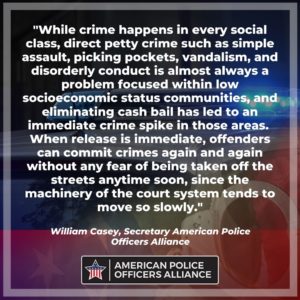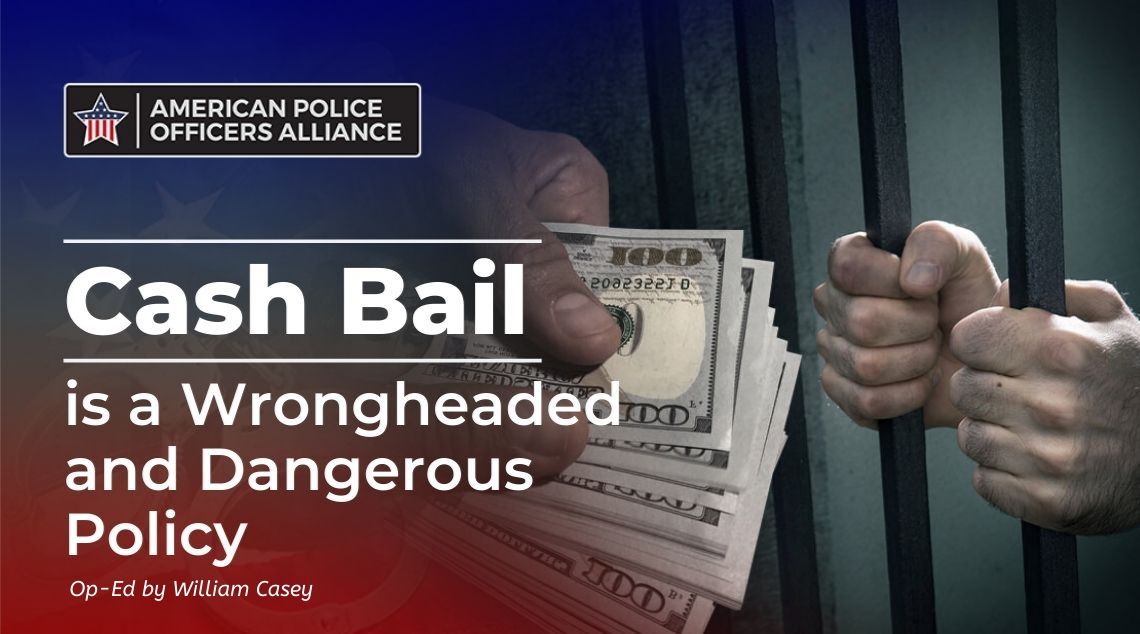Debates about cash bail have raged for decades. The philosophy boils down to: “Cash bail unfairly hurts and targets the poor, since rich people always have bail money available to avoid jail time. If a poor person is in jail over a minor crime, or worse, a misunderstanding, he’ll get fired from his job and get his life upended in the process. Ending cash bail will make the justice system fair towards everyone.”
Recently, New York has written a bill into law to end cash bail. (While bail reform efforts exist in multiple cities and states, New York’s reform is a de facto nationwide test case, as it includes New York City, by far the largest city and metro area in the nation. If cash bail is eliminated in further cities and states, New York’s success will likely be pointed to as a reason.)
Multiple people are dismissing negative press about bail reform as racist alarmism from the far right, and I admit that I originally assumed that bail reform was far less disastrous than people are now attesting. It’s far worse than we anticipated – even some violent crimes count under the law. The results of bail reform have been nothing short of disastrous since only the beginning of the year. These few headlines are from January and February, and the majority from New York:
“Bail agents: Seattle criminals ‘actively laughing’ in court expecting quick release”
”Serial Slugge r who targeted women released under new bail reform”
”NYC subway thief thanks Democrats after his 139th arrest, release: ‘Bail reform, it’s lit!’”
”Suspected robber targeted four banks, released under new law, strikes a FIFTH time”
”Man gets arrested three times in one day due to being released on bail reform law”
This is only a few of many headlines focused on covering New York’s bail reform experiment. I had to stop at five; with just a quick search there were well over twenty headlines to sift through, and it was numbing to read.
There is an uncomfortable truth that is being realized the hard way right now: while crime happens in every social class, direct petty crime such as simple assault, picking pockets, vandalism, and disorderly conduct is almost always a problem focused within low socioeconomic status communities, and eliminating cash bail has led to an immediate crime spike in those areas. When release is immediate, offenders can commit crimes again and again without any fear of being taken off the streets anytime soon, since the machinery of the court system tends to move so slowly.

Most of these crimes plaguing the headlines are non-violent in origin. Non-violent offenses can certainly impact lives just as much as violent offenses can. Let’s use a liquor store as an example, since those are often hit by shoplifters often. The crime results in a higher overhead cost of running the business due to constant losses – physical security guards are now needed, bars are put on the windows, and cameras need to be run 24 hours a day. The increased overhead will likely result in employees being paid less, which will mean that any particularly qualified staff will look elsewhere for work, and employee turnover will increase. This overhead may also result in the store owner having to buy a far more limited selection of spirits, wine, and beer for his customers, since he’s on a tighter budget. What may have been a standout liquor store will now be a decent liquor store at best, and the business is not going to be nearly as good as it could have been.
An expected response to this would be something like “that might be true, but the offenders will have their day in court soon enough, and it’ll be an open-and-shut case that they have no hope of winning due to their repeat offenses.” Duly noted – but skipping out on your court date isn’t a violent crime, is it? Neither is contempt of court. Some of the earlier linked headlines mentioned offenders skipping out on court as one of the many offenses. Offenders have proven that they have little respect for the law, and it will just get worse and worse when consequences are nullified for things like this. Implementation of the law depends heavily on general respect for the law, and, yes, a healthy amount of respect and fear of its enforcers like police and judges. This will become a massive societal problem if it spreads to more cities and states.
One of the benefits of jailing petty criminals for petty crimes is that they’re off the street, and will not commit other worse crimes in the meantime. That is quite common – bigger crimes like serious assault and rape often go unreported, and even worse ones like murder or manslaughter often go unsolved. Crime has spiked in New York 30% since this reform law was passed, and it’s likely to include the worst crimes soon if offenders feel invincible.
Due to this bail reform backfire, there is a palpable sense of panic in New York State right now among the Democrat establishment. Views on the law have done an about-face: New Yorkers supported the law by 17 percentage points at the beginning of the year, and now New Yorkers oppose the law by TWENTY-SIX percentage points. Governor Cuomo is walking back his earlier support of the law, and representative Alexandra Ocasio-Cortez is now in grave danger of losing her re-election primary, since bail reform has become such an unpopular issue in such a short period of time. “Give bail reform time,” she recently pleaded in a recent press conference, clearly realizing that this issue might drive away fairweather voters.
Criminal justice has been evolving throughout history, so it’s inevitable this discussion will occur- and it’s welcome. There are likely no fancy ways to avoid having prisons and preventing crime, but it’s always a good thought experiment to wonder how the system could be improved upon. This current reform attempt, though, has obvious problems that will affect the lives of millions of upstanding citizens and law enforcement – and it’s being pushed by those who likely don’t have to worry about the consequences of those problems. It’s about virtue signaling, nothing more. Rarely does a law backfire this immediately. This is going to be talked about for the next few decades.
A ballot measure is in the signature-gathering phase on the difficult road to the polls this November, and it could cement Missouri as a leader in immigration crackdown. Read more here.









